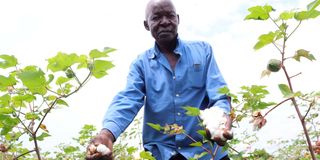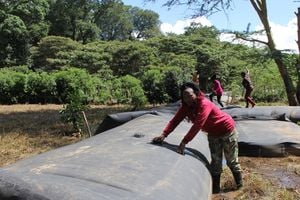Bad season for Homa Bay cotton farmers as many end up with stunted crops

Homa Bay County Cotton Cooperative Union Secretary Apiyo Oloo harvests cotton at his farm at Angalo village in Arujo Location in Homa Bay Sub-county on September 13, 2022.
Around this time last year, cotton farmers in Homa Bay County were a happy lot.
Everyone was expecting a bumper harvest following good weather conditions.
This year, however, the situation is the opposite. Many farmers are not happy as the crops they planted between March and April are not maturing faster than they expected yet the second planting season is nearing.
The current crop has not attained the required height and neither has it produced cotton fibre.
Some farmers believe the growth pattern has changed, but Homa Bay Cotton Cooperative Union chairman John Akoko, blames the stunted growth to low quality seeds as well as poor weather conditions.
"It appears the seeds we received this time from various organisations are not adopted to our climatic conditions," says Akoko.
Farmers in the area mainly rely on donated seeds from mainly county and national governments. This has been the trend for years as different institutions try to revive cotton farming in the region, which collapsed more than 30 years ago.
Union secretary Apiyo Oloo says this year farmers received seeds from a private ginnery for planting.
"The investor always helps us in production and later buys the crop after maturity," he says.
Oloo believes the seeds provided were not fit for the region as the crop has remained stunted. On his farm in Angalo village, Arujo location, the farmer expects to get between 800 and 900 kilos of cotton at the end of this month.
The same farm produced 1,500 kilos of cotton last year. "What we are witnessing is a mistake that was committed during planting.” Besides receiving seeds that are unfit for the region, Oloo claims some farmers did not apply pesticides to their crops after the county government failed to provide them with chemicals.
This has also led to some crops failing due to pest attacks. Currently, a kilo of cotton is sold at Sh55 for grade one and Sh25 for grade two. Grading is based on length, strength, fineness, maturity and trash content among other physical appearance.
Oloo notes most farmers are likely to get the second grade which has less value.
"The first grade fetches more cash and is mostly preferred by ginneries.”
Agriculture chief officer Samuel Owigo asked farmers to stop reliance on county government support.
“We did not supply them with pesticides this year. Farmers should play a role in ensuring their crops grow to maturity because funds were channelled to other areas.”





